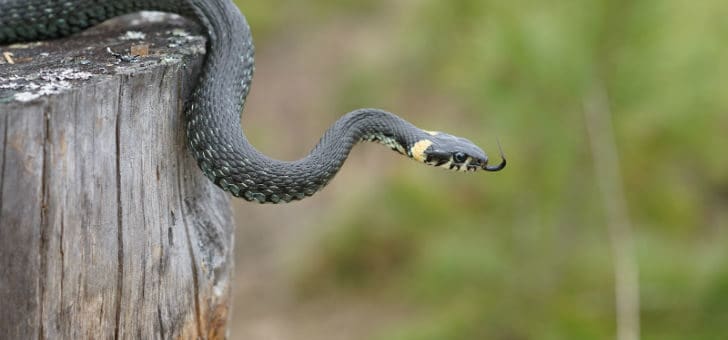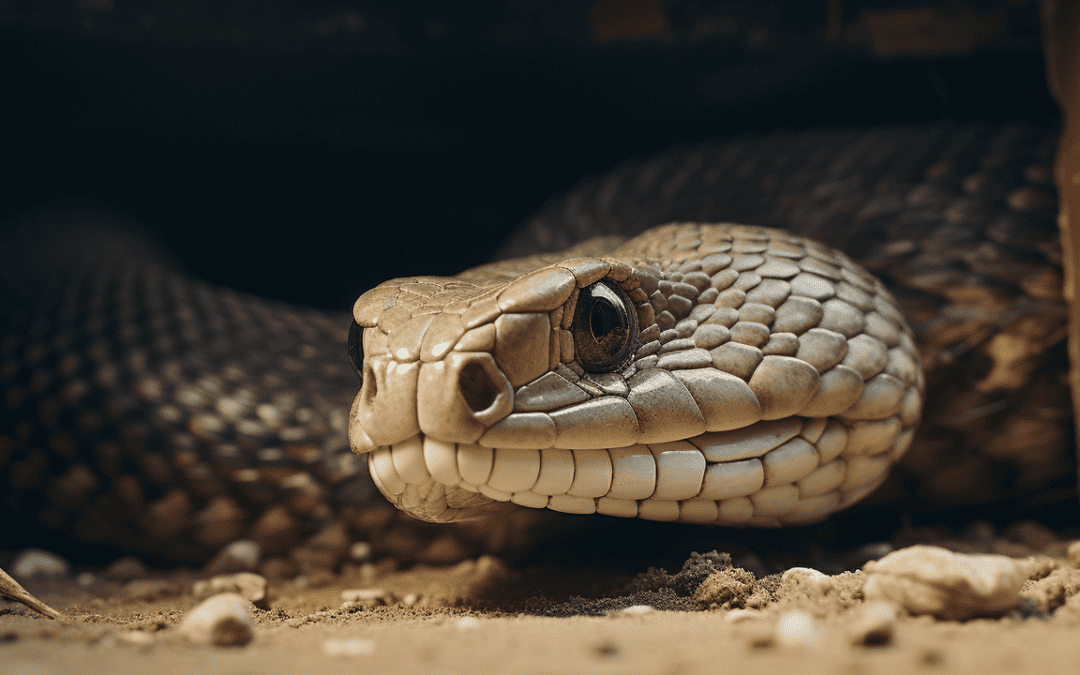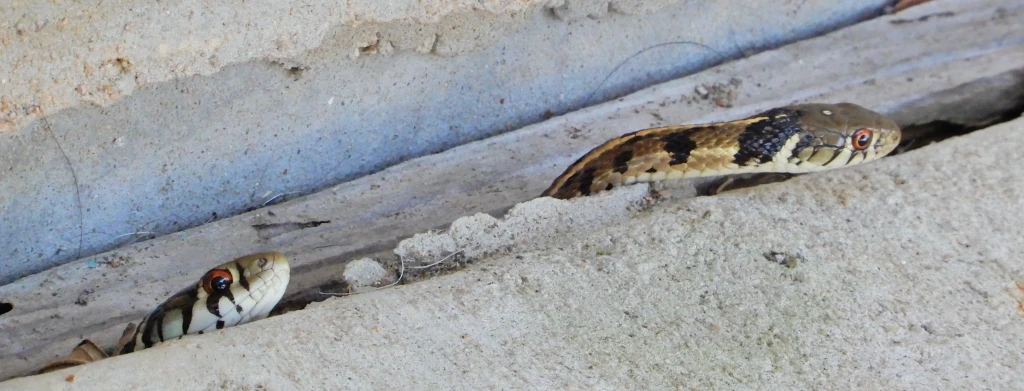READY TO GET STARTED?
REQUEST A FREE ESTIMATE
Fill out the form below or call (336) 226-1448 for a free, no-obligation estimate.

In Burlington and across Alamance County, the warm climate and diverse ecosystems are perfect for an abundance of snake species. While a snake in your yard or home can be startling, most are harmless and even helpful in controlling pests like rodents and insects. Learning to identify common snakes in North Carolina and knowing how to handle encounters effectively can help you feel more at ease.
Both non-venomous and venomous snakes are found throughout the state. Here’s an overview of the species you’re most likely to encounter in or around your home.
If you come across a snake, identifying it is key to understanding how to proceed. Here are some distinguishing features to look for but remember not to get too close when inspecting a snake.
If you’re not sure about the type of snake, it’s best to leave it alone and avoid handling or interfering with it.
Spotting a snake in your home or yard can be unsettling. However, you can take steps to manage the situation and reduce potential risks.
You can take steps to make your property less appealing to snakes and limit how often you see them near your home.
While encountering a snake might not be a pleasant experience, understanding their role in the ecosystem can help shift your perspective. Snakes are valuable for pest control and maintaining natural balance. By taking steps to identify and prevent encounters, you can reduce situations that cause stress and keep your property better protected.
If you’re facing recurring snake-related challenges, working with a pest or wildlife professional can provide tailored solutions to make your home and yard less attractive to them. With just a bit of planning and awareness, you can cohabitate with these fascinating creatures more easily.
Contact us today for a free snake control quote. Give us a call or click the button below to get started!

Finding a snake in your crawl space is never a pleasant surprise. But why do they love these areas so much, and more importantly, how can you keep them out? For homeowners in North Carolina, understanding what attracts snakes to crawl spaces is the first step in preventing unwanted visitors.
Snakes aren’t out to scare you—they’re just looking for the perfect hiding spot. Crawl spaces provide everything they need to feel hidden and secure. Here’s why your home might be attracting them:
As cold-blooded creatures, snakes rely on external warmth to regulate their body temperature. Crawl spaces offer a cozy retreat, especially during cooler months.
If you have a rodent problem, you might also have a snake problem. Mice, rats, and insects provide a food source that keeps snakes coming back.
Damp crawl spaces create the ideal environment for many snake species. If your crawl space retains moisture, it could be more inviting than you think.
Since crawl spaces aren’t areas we frequent, they give snakes the peace and security they crave.
Before taking action, it’s important to know if a snake has already moved in. Look for these common signs:
Pro Tip: If you’re unsure about checking your crawl space, consider calling a professional for a thorough inspection.
Once you’ve identified potential snake activity, it’s time to take action. Here’s how to snake-proof your crawl space and keep your home pest-free:
Snakes can squeeze through surprisingly small gaps. Inspect your crawl space for any openings and seal them with materials like:
Many older homes have open or loosely sealed crawl spaces. Installing a well-fitted crawl space door can keep snakes and other pests out.
A clean, dry crawl space is far less inviting to snakes. Make your home less appealing by:
Some homeowners find success with natural or chemical snake repellents. Look for options that are non-toxic for pets and follow application instructions carefully . Professional pest control services can help with distributing products such as Serpent Guard to protect your home.
Making your yard less snake-friendly can prevent them from getting close to your home in the first place. Try these simple landscaping tips:
North Carolina’s climate makes it a prime location for snakes, but that doesn’t mean they should be living under your home. By sealing off entry points, removing food sources, and modifying your yard, you can eliminate a snake in your crawl space—without harming them or the environment. Need help protecting your home? Contact a local pest control expert to ensure your crawl space stays snake-free year-round!

North Carolina’s natural beauty comes with its share of wildlife, including an array of native snake species. While snakes play an essential role in the ecosystem, it’s important to enjoy outdoor spaces responsibly and understand how to coexist with these creatures. Whether you’re a pet owner or an avid gardener, these practical tips will help you reduce the likelihood of unexpected snake encounters.
With habitats ranging from forests to backyards, snakes can sometimes wander into residential spaces. North Carolina is home to a variety of non-venomous and venomous snakes, such as the copperhead and cottonmouth. While most snakes prefer to stay out of sight, understanding their behavior and taking precautions can make outdoor spaces more enjoyable for everyone—including your pets.
Here are four expert-backed recommendations to help you feel more prepared and avoid potential run-ins with snakes in your area.
Snakes are experts at staying hidden, often blending into their surroundings. Piles of leaves, brush, or tall grass make ideal spots for snakes to rest or hunt. If you need to move debris or explore an area where visibility is limited:
This habit is especially helpful for pet owners. Dogs and cats, driven by curiosity, might stick their paws or noses into these concealed spaces. A quick check could save them from an uncomfortable encounter.
What you wear makes a big difference when spending time in wooded or grassy areas. Boots and gloves can offer an added layer of protection when you’re gardening, hiking, or clearing debris.
Outfitting yourself properly is a small effort that can go a long way in making outdoor activities more comfortable and stress-free.
Snakes gravitate toward cluttered areas where they can feel protected and hidden. By minimizing hiding spots in your yard, you reduce the chance of them settling nearby.
These simple steps create a more open environment, making it easier to spot any visitors from a cautious distance.
Many snakes are more active at night when temperatures are cooler. Whether you’re walking your dog or taking out the trash, a flashlight can help illuminate your surroundings and reveal anything that might surprise you in the dark.
For pet owners, this practice is especially beneficial. Dogs in particular are prone to investigating unfamiliar nighttime smells, so carrying a flashlight keeps you one step ahead.
Snakes are an important part of North Carolina’s ecosystem, helping to control pests and maintain balance in nature. While encountering one unexpectedly may be unnerving, taking these precautions allows you to enjoy your outdoor spaces with greater confidence. Cultivating a clean yard, wearing suitable attire, staying vigilant, and arming yourself with tools like flashlights can significantly reduce your chances of a surprise encounter.
For pet owners, keep in mind that awareness is a two-way street. While these tips will help you stay prepared, always keep an eye on your pets when they’re exploring outside. With a little preparation and help from your local pest control experts, you and your furry friends can coexist peacefully with North Carolina’s wildlife.